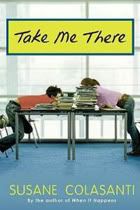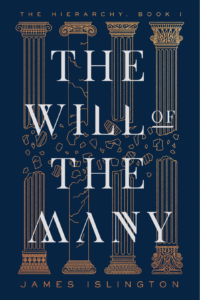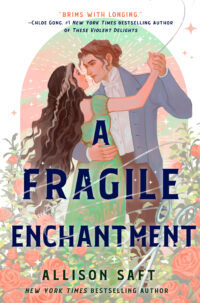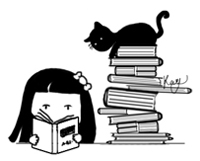Review : Take me There
 Take me There by Susane Colasanti
Take me There by Susane Colasanti
Pages : 290
Genre : Young Adult
My Rating : ![]()
In one short week . . . three lives change.
Rhiannon is devastated after the breakup with her boyfriend and wants him back. Nicole’s ex is still in the picture, but she can’t help having a new crush. James and Rhiannon are just friends, though he may try to take it to the next level. Will their desire to take a mean girl down a notch bring these three friends what they want . . . and more?
Take me There’s narration had everything to be interesting. Telling the friends’ story on one single week, the book is split in two parts of the week, each narrated by the three main characters : Rhiannon, Nicole and James. Colasanti succeeds in giving each of them their own voice – but I’ll get back to that in a minute.
The book is light and easy to follow; it’s mainly predictable, but the characters are entertaining enough to make the road to the end worthwhile. It’s pure high school drama; love stories, popularity quests and homeworks. The author did a great job on that point, and for the time I was turning these pages, I almost felt like I was back to high school – in a not too horrific way, that is.
James story was good, not great, and I felt he was mostly used to give the answers the other two characters couldn’t. He was a pale figure in the story, not annoying but not astounding either. I would have loved to see his part given to Daniel, Nicole’s ex boyfriend : he was an amazing character, with more facets than any of the main narrators. As for Rhiannon, I liked her; she was filled with dreams and imagination, and I really felt for her little broken heart. The way she dealt with it brought me a few years back in time…
And then there was Nicole. And that’s where I almost lost my mind. Nicole says “like”, like, a lot. And beging her sentences with “and”. And she does that, like, a lot. And sometimes it’s with “but”. But anyway. It was like, annoying. And also, she like, stopped in mid-sentence. A lot. And that too was annoying. A lot. And like, it was a little too much.
Don’t get me wrong; as a character, I liked Nicole. I thought she had the greatest storyline of them three; she was the one I worried for, the one I simply had to know what would happen to her in the end. Sadly, the way she talked really irritated me. I understand that Colasanti tried to create a language the teens could relate to – but how much is too much? A few “and” and “like” are good, but their constant presence in every sentence annoyed me to no end! I don’t think it’s only due to my “old age”, either; when I was a teen, any grown up attempting to talk “teen language” made my eyes rolled over and over. I’ve always preferred a more “literate” approach to the narration, but that’s just me.
What do you think about “teen talk” in YA literature? Do you feel like the authors get it right, or do you prefer when they make use of a regular voice? Do you think a book with current “teen talk” will have a less chances to stand the test of time?
I do. The YA world moves so fast, the language and fashions change constantly. Personnally, and that’s only my opinion, I prefer when an auhor insists on a young adult’s attitude and thoughts that on his language. I’m sure a teen’s first heartbreak felt the same in 1989 tahn it does in 2009. It might be dealt in a different way – facebook and all – but the feelings stay the same. The language doesn’t.
Take this personal exemple. When I was 10 and my sister was 16, the word to say was “top”. Every French Canadian used “top” to define his or her existence, whether “top great” or “top bad”. 6 years later, when I was 16, the “top word” to say in every sentence was “cool”. Move forward another 6 years after that, when my friend’s sister hit 16, and the word was “chill”. Even when that didn’t make sense in a sentence, the word just had to be there.
And don’t even think about saying something is “top” anymore; that’s like, so not “chill”.
I think there are so many beautiful, wonderful novels that were written without such a use of teen talk and that teens can relate to. Harry Potter doesn’t do “teen talk” much, and yet, he’s doing great!










Great review. I think you’re right that the language may change but the feelings are the same. 🙂
One of the reasons people dislike Pretties is because of the language Scott Westerfeld gives the Pretty characters. It’s almost like valley-girl speak. Because I understood what he was doing, it didn’t bother me, and that’s actually my favorite of the series.
On the other hand, Westerfeld created his own slang, his own language pattern, and that keeps the book from getting old. When a book uses teen talk that is specific to a certain time period, the book gets old fast, until it’s been old long enough to become a historical record of sorts. By then, it’s not likely people know about it anymore.
In writing, I try to avoid things that will date my stories too much. I think up to date teen talk isn’t the best idea.
I agree with you to some extent. I think if handled well, teen talk can enhance a character’s voice. The thing is, I don’t think most authors do it well. I think Sherman Alexie’s The Absolutely True Diary of a Part-Time Indian is an example of teen talk done well.
But then I guess the difference there is that it’s a diary, so first-person narration is key. Meg Cabot’s Princess Diaries are the same way (though after awhile, the narrator in those books comes off as whiney). It’s funny to think about this because when I was a teenager, my diary almost never had slang in it. I don’t know if that’s an exceptional case. But somehow I think of books where the narrator is a teen as more “real”.
Sounds like a good read, but I’m sure the dialogue would aggravate me! When “teen talk” is done well — the first example that comes to mind is Megan McCafferty’s Sloppy Firsts — I think it really, really works. But when it’s done poorly, it just makes the novel sound dated — even if it’s not. I think books filled with “teen talk” will have a harder chance of remaining relevant, especially to future teens, and that’s sad… because many of the plots probably are great and universal.
And you’re right — not a lot of teen talk in Harry Potter, and he hasn’t needed it at all! 🙂
I’m so out of it when it comes to teen talk, I wouldn’t know if an author got it right or not.
Thanks everyone, it’s so interesting reading your opinions! It also made me realize a few things :
– I don’t mind “teen talk” as much in the conversations as in the narration.
– If the narration is a diary, it’s something I can live with, too. Or at least, a little more 😉
– M, I agree that part of it can make the characters more real; but as you so well said, it has to be handled well. I thing there also is a thing as “too much”, and in this case, that’s what it felt like at times. The two other narrators used it too, but in a more moderate manner, and I was completely fine with it! 🙂
– Amanda : Now I’m even more curious about reading this! We’re going to my in-laws this weekend and I’ll probably have Pretties in my backpack!